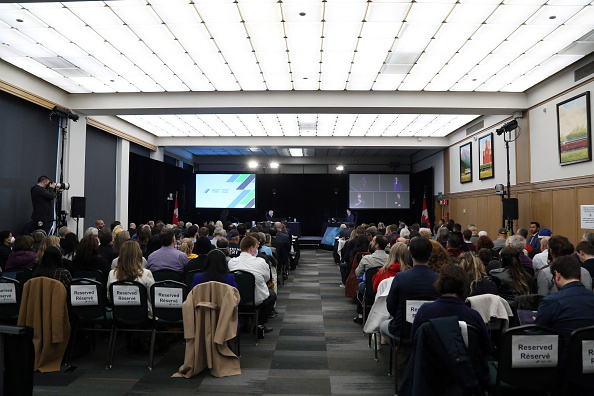
Prime Minister Justin Trudeau (rear C R) testifies before the Public Order Emergency Commission public inquiry on November 25, 2022, in Ottawa. (Photo by Dave Chan / AFP via Getty Images)
By
The report into the first-time use of the Emergencies Act by the Trudeau government last year will be tabled in Parliament on Feb. 17, the Public Order Emergency Commission has announced.
After having presented the report to Parliament, Commissioner Paul Rouleau will read a statement which will be broadcast live on the inquiry’s website.
The commission says Rouleau will not be taking questions from the media or doing follow-up interviews.
A press release also notes a number of constraints applied to journalists seeking to read an advanced copy of the report, such as attending a lock-up.
Journalists’ communications devices need to be put on airplane mode and stored in lockers and the commission says electronic transmissions may be monitored during the lock-up.
The report will be under strict embargo until Rouleau starts reading his statement in Parliament.
The date of the tabling of the report drew some controversy when the Liberal cabinet requested to receive an advanced copy on Feb. 6, and gave a deadline of Feb. 20 for tabling it in Parliament.
The commission was granted an extension in early February and the government removed the Feb. 6 deadline.
“Cabinet should not have access 2 weeks before the Canadian people,” Conservative MP Leslyn Lewis had tweeted on Feb. 1 before the change of deadline.
“The inquiry report was ordered by section 63 of the Emergencies Act & the date to table it in Parliament is fixed in the Act. This isn’t an Inquiry ordered by [Justin Trudeau]. It’s statutorily prescribed.”
Commissioner Rouleau heard extensive testimonies from stakeholders and observers during public hearings last fall, but a key piece was missing: The Liberals chose to not reveal the legal opinion it used to justify invoking the Emergencies Act on Feb. 14.
At that time, the trucker-led Freedom Convoy protest demanding the lifting of COVID-19 restrictions had been in Ottawa since Jan. 28, and border blockades had surfaced across the country.
The inquiry heard during the hearings that security agencies did not assess the events to constitute a national security threat and that police officials did not believe invoking the act was necessary to deal with the situation.
The government said it possesses the authority to determine what constitutes a national security emergency and doesn’t need to strictly follow the definitions set in the act, with the prime minister’s National Security and Intelligence Advisor Jody Thomas calling them too narrow.